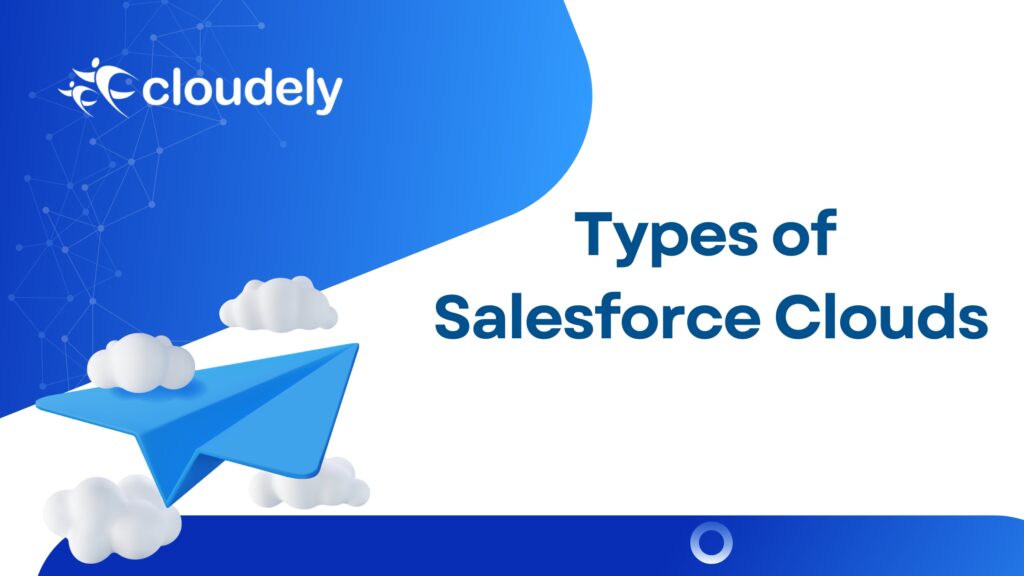With the rising complexity of managing interactions across multiple channels, Salesforce is helping businesses stay on top of evolving customer needs through its extensive cloud ecosystem. Keeping track of customers, partners and data across departments remains challenging. This is where Salesforce excels – by bringing all customer data together in one place and optimizing processes through automated workflows. Underpinning it all types of Salesforce clouds, workflow automation, and Einstein artificial intelligence – all designed to break silos and present a single unified view of customers.
Salesforce Clouds and Their Benefits
Let’s now explore types of Salesforce clouds in more depth.
Sales Cloud
Sales teams looking to boost productivity with tools for tracking pipelines, managing territories and analyzing performance can use it.
Key benefits
- Manage leads, opportunities, accounts and pipelines from a single dashboard.
- Configure automated workflows like lead routing and opportunity scoring.
- Leverage AI with Einstein Prediction Builder to prioritize top leads.
- Access client data from any device with the Salesforce mobile app.
Service Cloud
It should be used by companies seeking to enhance customer satisfaction and retention through multichannel support.
Key benefits:
- Route cases, emails, chats, and tweets to the right agent instantly.
- View customer history, open cases, purchases, and entitlements in one place.
- Automate common requests with Lightning Flow workflows.
- Measure team performance with ready-made dashboards.
Marketing Cloud
Brands looking to personalize campaigns, measure performance and streamline marketing operations must try different types of Salesforce clouds.
Key benefits:
- Craft personalized, large-scale marketing campaigns across channels.
- Build sophisticated marketing automation workflows with Journey Builder.
- Leverage behaviour-based AI with Salesforce DXi to trigger timely messages.
- Maintain customer profiles and segment audiences for 1:1 marketing.
Commerce Cloud
Online sellers and retailers seeking to increase average order value through improved storefronts and purchasing convenience can benefit from use.
Key benefits:
- Launch merchant storefronts in record time with the Lightning framework.
- Manage complex product catalogues, bids, and auctions.
- Optimize shopping experiences across responsive websites, mobile apps, and marketplaces.
- Drive more sales with AI-powered personalization, recommendations, and predictive searches.
Experience Cloud
Organizations aiming to cultivate community, streamline knowledge sharing and build brand advocacy through customized online spaces should work on this cloud.
Key benefits:
- Quickly deploy portals, intranets, and extranets using responsive Lightning templates.
- Enable self-service through knowledge bases, guided workflows.
- Foster collaboration with workplace digital towns and groups.
- Scale communities and social networks for online customer support.
Analytics Cloud (Tableau CRM)
It is beneficial for data-driven companies looking to surface trends, predict outcomes and optimize processes based on facts rather than gut feel.
Key benefits:
- Visualize Salesforce and third-party data with blazing-fast Tableau CRM.
- Forecast future trends using Einstein Discovery predictive models.
- Create custom dashboards with clicks rather than code in Tableau.
- Make data-driven decisions by locating insights across datasets.
Integration Cloud
Useful for enterprises with complex tech landscapes requiring synergized processes across several best-of-breed solutions.
Key benefits:
- Connect any API or database to CRM using hundreds of MuleSoft connectors.
- Build real-time integrations and process events with a simple graphical UI.
- Manage Apis, monitor integration health, and analyze usage from one portal.
- Ensure scalability, reliability, and security for critical data pipelines.
Financial Services Cloud
Financial institutes seeking deeper customer understanding can use it in depth to personalize advice and simplify complex processes.
Key benefits:
- Manage financial holdings, accounts, transactions, and trades.
- Configure roles, entitlements, and flexible user security.
- Automate complex compliance workflows for SOX, MiFID II, and more.
- Foster collaboration across global teams with portals and communities.
Health Cloud
Healthcare organizations aiming to deliver more coordinated, proactive and personalized care through better patient data utilization should consider this cloud.
Key benefits:
- Maintain longitudinal patient records and histories in one HIPAA-compliant system.
- Coordinate care teams by securely connecting various clinical workflows.
- Automate coding, charge capture, and revenue cycle workflows for reimbursement.
- Enable self-scheduling, payment portals, and wellness for consumer experience.
Nonprofit Cloud
Non-government organizations seeking increased revenue through optimized campaigns and community building can take help from the cloud.
Key benefits:
- Track constituents, donors, and programs using flexible engagement models.
- Manage complex grants, pledges, and fund disbursements end-to-end.
- Automate labour-intensive processes like membership, recurring donations.
- Foster collaboration internally and with partners through portals.
Salesforce Consumer Goods Cloud
It benefits manufacturers and distributors, aiming to eliminate supply chain inefficiencies and optimize production based on demand signals.
Key benefits:
- Optimize trade promotions, listing requests, and volume allocations with partners.
- Gain end-to-end visibility into the supply chain from raw materials to shelf.
- Provide technical data to sales teams through quality content and assets.
- Leverage AI for demand forecasting, personalized marketing, and product innovation.
Salesforce Retail Cloud
It can be used by brick-and-mortar and omnichannel retailers seeking to compete through consistent, hyper-personalized customer experiences.
Key benefits:
- Unify customer profiles across physical and digital touchpoints.
- Ensure consistent brand experiences via a centralized catalogue and merchandising.
- Streamline fulfilment and inventory allocation regardless of order origin.
Salesforce Net Zero Cloud
Conscientious enterprises aiming to build reputation and competitiveness through responsible operations can take this cloud into account.
Key benefits:
- Track emissions from offices, fleet, and product use cases in one dashboard.
- Model various carbon reduction scenarios and offset strategies.
- Automate data collection from disparate systems into a single source of truth.
- Benchmark performance against industry and evolve Science Based Targets.
Taking The Next Step
As customer expectations intensify in today’s digital-first world, technology alone cannot guarantee success – effective execution is vital. Types of Salesforce clouds pride themselves on fostering long-term partnerships that enhance business value after implementation.
Cloudely helps businesses to make more ROI from Salesforce. Email us at salesforce@cloudely.com to learn how to maximize your Salesforce investment.
